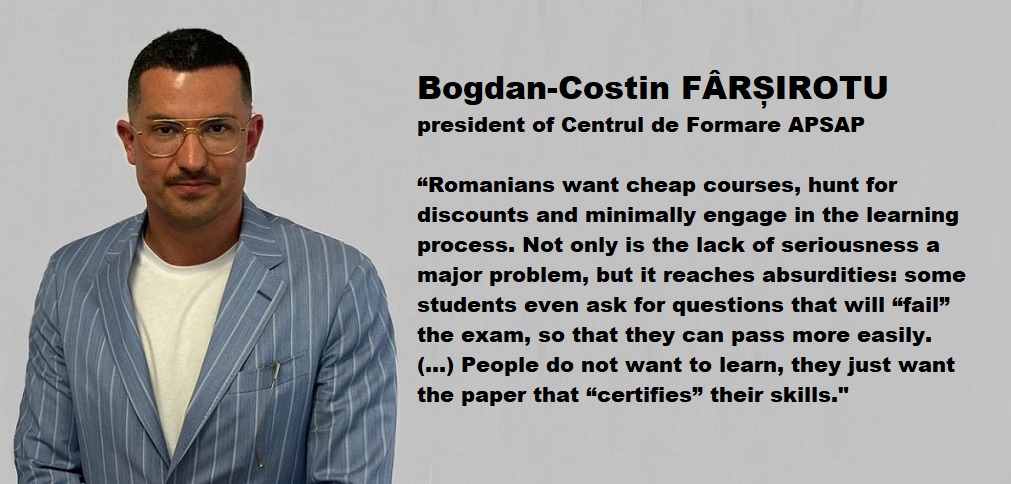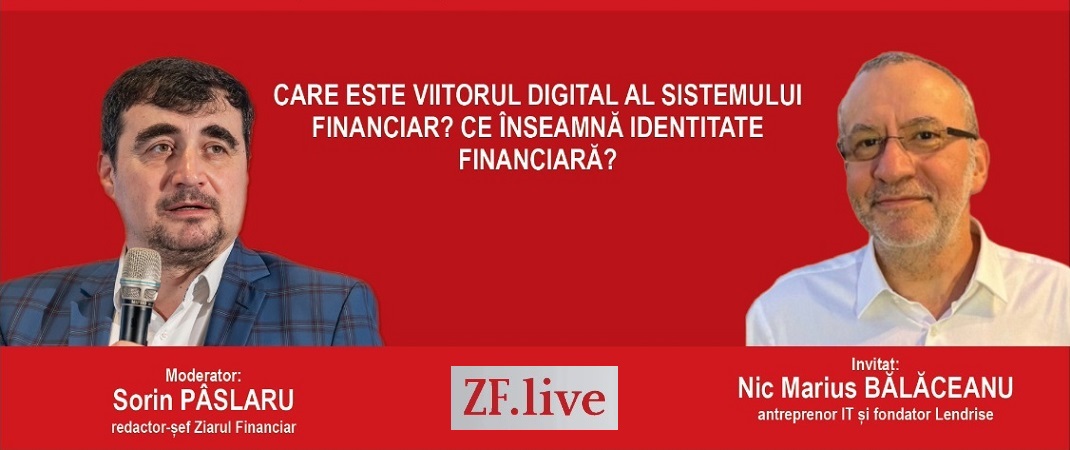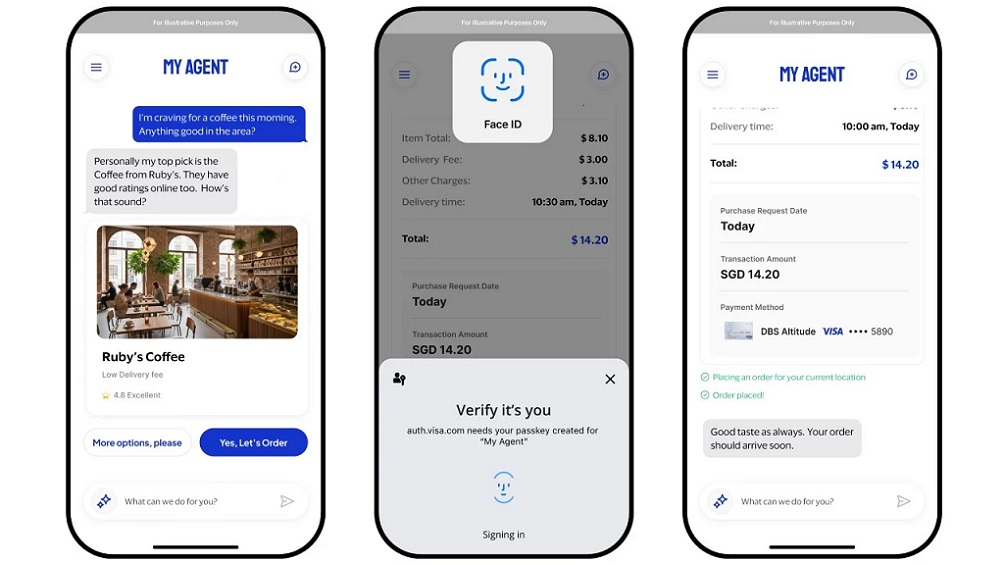Centrul de Formare APSAP: Romania is in last place in digital education. „People do not want to learn, they just want the paper that “certifies” their skills”.

Only 10% of Romanians with Internet access have taken some form of online education. In addition, Romanians are deficient in developing new skills because they abandon training courses. Over 30% of those enrolled drop out before the training begins.
According to Eurostat, Romanians have little interest in developing new skills and digital abilities that would help them advance professionally, ranking last in the EU in online education. Although they enroll in training courses in various fields, some Romanians have a harmful mentality – they do not want to learn, but only want to obtain an accredited diploma, which will „certify” them of skills that they have not acquired, shows an analysis of the behavior of course consumers carried out by Centrul de Formare APSAP, the largest training and advanced training center in the country.
Only 10% of Romanians with Internet access have taken some form of online education, which places Romania in last place in the EU, far from the lead held by Ireland (61% of users), the Netherlands (59%) or Finland (53%). Among the causes are the low rate of college graduates, but also the low interest in formal education, in developing skills in general and in developing digital skills, and the erroneous perception of online learning, which in Romania is disregarded, still seen as inferior to that which takes place in a physical setting.
Online learning, still disregarded in Romania – Online learning continues to be a controversial topic in Romania. The public between the ages of 20 and 45 is generally open to digital education and does not perceive it as inferior to traditional learning. However, people over 45 are more reluctant, considering that physical learning is the only one that offers real results. Among the reasons for this perception is the emergence and growth of the number of course providers, many unaccredited, who promise fast learning and high income without thorough training.
Some students want to know the exam questions, others drop out of classes after enrolling
“Romanians want cheap courses, hunt for discounts and minimally engage in the learning process. Not only is the lack of seriousness a major problem, but it reaches absurdities: some students even ask for questions that will “fail” the exam, so that they can pass more easily. The reality is sad and outrageous: 20% of students who claim to have a bachelor’s degree do not even have a high school diploma. There are training programs that require completed university studies, and the condition is published on the course website. However, some try to fool the system, presenting instead of a bachelor’s degree a high school transcript, or a high school diploma with low grades. These attempts are not only fraud but also reflect a dangerous mentality: people do not want to learn, they just want the paper that “certifies” their skills. It’s no wonder that the Romanian educational system produces specialists „on paper”, but without real knowledge,” explains Bogdan-Costin FÂRȘIROTU – president of Centrul de Formare APSAP and founder of the cursuri-functionari.ro platform.
In addition, Romanians are deficient in developing new skills because they abandon training courses. Over 30% of those enrolled drop out before the training begins, according to an analysis by Centrul de Formare APSAP conducted on a sample of over 3,000 people who enrolled in courses in 2024. Dropout most often comes when people find out that they have to submit documents proving their studies, they have to allocate real-time for theoretical and practical training, there are assessments and an exam at the end, or there is a possibility of not graduating from the course if they do not obtain the minimum passing grade.
„Romanians’ interest in digital skills development courses remains alarmingly low, and labor market data confirms this painful reality. In 2024, the most sought-after job in Romania was that of a driver, according to recruitment platforms, a clear signal that the professional orientation of Romanians is still far from the requirements of the digital economy. Centrul de Formare APSAP provides multiple programs for developing digital skills, including advanced cybersecurity courses but also modules for beginners, such as the digital skills course in Microsoft Excel, Word, and PowerPoint. Access to this program requires at least 10 completed classes but the reality of the courses is shocking: not infrequently, participants showed up without a computer, connecting to online lessons on their mobile phones, with the impression that they would be able to work in Excel… on paper. This is the real picture of digitalization in Romania: lack of access to equipment, lack of digital education, and an economy that still does not prioritize the development of these skills.”, adds Bogdan-Costin FÂRȘIROTU.
According to a study conducted by the Centrul de Formare APSAP, based on a sample of over 2,500 respondents nationwide, approximately 30% of participants declared that they had an advanced or expert level of digital skills. In reality, the responses from the same study show that these skills mainly consist of “browsing and searching the internet effectively” and “using office applications”, which does not necessarily reflect an advanced level of digital expertise.
Romanians’ interest in developing new skills is correlated with the low level of education of the majority of the population. According to Eurostat, Romania ranks last in the European Union in terms of the number of young people with university degrees, with only 1 in 4 young people completing a form of higher education. At EU level, 42% of people aged 25 to 34 are university graduates.
“These realities demonstrate that, without a profound change in the perception of education and a clear strategy to stimulate digital skills, Romania will continue to remain disconnected from modern educational trends and the demands of the 21st-century labor market. Also, the poor infrastructure in rural areas is another reason why Romania has lagged behind in digital education. High-speed internet access and the devices necessary for online learning are still limited to the village, making participation in digital courses impossible for a large part of the population,” says Diana-Antonia PAVEL, Executive Director of Centrul de Formare APSAP.
Dariusz Mazurkiewicz – CEO at BLIK Polish Payment Standard
Banking 4.0 – „how was the experience for you”
„To be honest I think that Sinaia, your conference, is much better then Davos.”
Many more interesting quotes in the video below:









